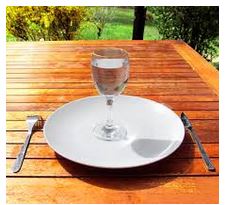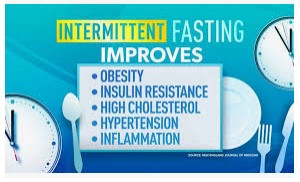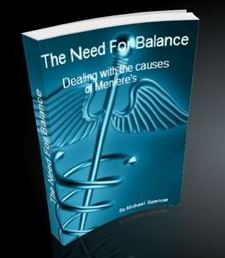Fasting with Meniere’s Disease
Posted Under: General Information on Meniere's Disease / Syndrome,Meniere's Disease and Nutrition,Meniere's Disease Triggers & Causes
How does fasting affect your condition when you suffer with Meniere’s Disease?
Table of Contents

Fasting with Meniere’s disease, is it a good idea? Can it help or can it make things worse?
What you eat and do not eat, the regularity and size of your meals can make a difference both positively and negatively if you are a Meniere’s sufferer.
Dietary considerations are important for the Meniere’s sufferer and there are many posts and articles on this blog and the main site (Menieres-Help.Com) related to this. (see bottom of page for links)
I recently received two emails that both mentioned fasting, one suggesting it produced good results while the other suggested it might have affected her condition in a negative way.
Fasting with Meniere’s disease – the Pros and Cons
Positive:
Hey Michael,
I’m doing pretty good. I’m taking more of the grape seed extract to stop dizziness. And thankfully it does help me. I have cut salt out of diet even with prepared foods. Sodium is so my enemy. I fasted for 3 days recently and had no dizziness at all. So I know it is food. I continue to be careful. God I miss potato chips.
I recently realized that I may be harboring candida yeast in my body–saliva test positive…….
Thanks very much for asking after me. I do appreciate your emails.
Negative:
Mike,
Thanks for answering. I kept telling the doctor this thing started out in my digestive system. I had very minor symptoms at the time in regards to hearing, and then the vertigo was so slight as to be interesting is all. But the GI system was definitely an issue, but I tended to dismiss it in hopes it would pass.
I noticed the diet link from the outset, and remember telling the doctor I felt fine when I fasted and/or went longer periods in between meals. Unfortunately that has changed a bit now, and fasting became a bit of a problem in that it induces the menieres. that nausea and such was he precursor to any vertigo/dizziness, and not the result of it. I had neck tension that accompanied it, and at one point the tension and vertigo hit simultaneously or in concert, and the tension so powerful that it virtually strangled blood supply to the back of the head. You could tell by when it wore off, the tingling of circulation resuming. that cycle has stopped for now, but I’ve noticed a hint of it again, and the associated GI issues are popping up again. I’ve been keeping a log of sorts as to my diet and symptoms for a little short of 6 weeks now. Although I’ve detected some interesting information, I still haven’t got a definitive culprit yet.
On the one hand, if toxicity were an issue, gut problems or food allergies were present it would seem logical that fasting could help detox and as a result help the symptoms of Meniere’s. On the other hand, it is recommended that Meniere’s sufferers keep to regular eating times and not overindulge.
In terms of clinical studies I only found one listed that was any way related to fasting and Meniere’s on PubMed.gov dated 2006:
‘The effect on health of alternate day calorie restriction: eating less and more than needed on alternate days prolongs life.’
In the study it was stated that,
“Restricting caloric intake to 60-70% of normal adult weight maintenance requirement prolongs lifespan 30-50% and confers near perfect health across a broad range of species.”
It went on to state,
Since May 2003 we have experimented with alternate day calorie restriction, one day consuming 20-50% of estimated daily caloric requirement and the next day ad lib eating, and have observed health benefits starting in as little as two weeks, in insulin resistance, asthma, seasonal allergies, infectious diseases of viral, bacterial and fungal origin (viral URI, recurrent bacterial tonsillitis, chronic sinusitis, periodontal disease), autoimmune disorder (rheumatoid arthritis), osteoarthritis, symptoms due to CNS inflammatory lesions (Tourette’s, Meniere’s) cardiac arrhythmias (PVCs, atrial fibrillation), menopause related hot flashes.
This may be of greater significance than realized at first glance as, although Meniere’s is mentioned directly, it also mentions conditions that have been linked to Meniere’s: seasonal allergies, viral, fungal and bacterial infections, sinusitis and autoimmune disorders.
Regular fasting in general is believed to be very beneficial to human health.
Dr Ed Group of the Global Healing Center explains the benefits of fasting for health in general, while some points can be directly related to Meniere’s. (see the emboldened below)
“Therapeutic fasting dates back to Hippocrates, who prescribed it for many ailments. At the time, it was the only successful way to reduce seizures in epileptic children and remained so until the 20th century.
Many people find that fasting sharpens their mind and provides mental clarity. Interestingly, many of the benefits of fasting don’t result directly from fasting itself, but from the effects of reduced calorie intake, decreased fat composition, better sleep, less diet-related inflammation, and lower intake of salt.
Blood pressure tends to fall during the fasting state, primarily during the first week of fasting. This effect seems to result from a lower salt intake and a detoxification of accumulated salt through the urine. Since excess sodium causes your body to retain water, lower sodium levels lead to better fluid balance in your tissues.
Fasting and calorie restriction inhibits the production of free radicals and irritating proteins like inflammatory cytokines.
Fasting triggers the recycling of old white blood cells—the cells that comprise much of your immune system. Recycling these immune cells leads to a more competent immune system. It works by triggering the regeneration of the stem cells that become your platelets, red blood cells, and white blood cells when you begin eating again.
Researchers found that the effects of fasting on blood sugar and insulin levels also improves the brain’s response to mental stress and protects it from stress-related damage.”
Fasting is not starvation and there are many types of fasting depending your required results or reason for doing so.
The obvious problem for some with Meniere’s may be the need to eat at regular intervals. I did not find much in terms of fasting from the 9000 odd emails to Meniere’s Help from sufferers, so I posed a simple question in three online Meniere’s groups on FB.
The responses were an interesting mix of positive and negative experiences with some somewhat neutral, though not all were from experiences of what you might call true fasting, and not fasting related to Meniere’s, they were revealing none the less:
Question posted: “Has anybody tried fasting? What were your experiences, positive or negative?”
Positive comments:
“I don’t eat a lot as it is and I have never had a problem with fasting.”
“It definitely helps me, however I haven’t found any food triggers. It’s mainly stress and poor sleep that affect me.”
“If the MD in you has an autoimmune component, it should help. If it helps, then when you reintroduce the trigger foods, the MD will rear its ugly head again. Keep a food dairy. That will help you identify the food triggers.”
“I only eat fresh fruits and vegetables, and meat. Mostly chicken and turkey. I do not eat processed foods, fast foods, carbs, sugar and limit sodium intake and caffeine. I drink a gallon and a half of water every day. I exercise riding a stationary bike and lifting weights. With this and the meds I am taking…I am attack and dizzy free now for going on 3 weeks. Was having 1-2 attacks everyday for a month.”
“I do an intermittent fast once in a while. About 500 calories for the day. However, I try to maintain my sodium levels throughout the day for consistency. I drink an electrolyte drink to help with this. I’m doing well with it!”
“I do a fasting diet and it is ok if I’m careful and plan my food and day well. If I take some time off the diet I struggle for the first week back on it so have to do it gradually, e.g. instead of going straight back to a 500 calories day I’ll do some 800 calories days first
(It’s the 5:2 diet, 500 calories 2 days a week and eat normally the rest of the time)”
“I had to fast last week for a medical procedure. Clear liquid diet for 24 hours. I got a headache but no other problems at all.”
“I do fast with MD. Key is to Drink lots of water with electrolytes. If you are going to fast for more than 24 hours, break your fast every 12 with a snack. It’s not recommended to fast more than three days for even a healthy person. This is a true fast. I do this once a month for religious purposes. Of course, there are times, when it’s just not possible.”
“I have an attack… I cut way back on my foot intake only eating very low sodium and next to nothing in general. This seems to make my hearing and symptoms better.”
Negative Comments:
“If I don’t eat something, it seems to make my Menieres worse”
“I used to fast but since menieres do not anymore. Body just doesn’t cope I get very dizzy etc”
“I would be extremely sick were I to fast.”
“I get dizzy if I miss lunch x”
“I wouldn’t try it x”
“I have bad eating habits. Low blood sugar triggered me.”
“I used to be able to fast when I was initially diagnosed about 8 years ago but in the last 3 years or so I can’t fast. I take Serc three times daily and found that I must keep hydrated and eat timelously otherwise my symptoms increase e.g. Pressure in my ears”.
“I can’t fast, I get so dizzy and nausea”
“Very bad”
“I eat as soon as I get up, & take my meds. Or I will……”
“I have to eat regularly, otherwise I feel quite poorly”
“I can’t. If I go too long between meals I will get a vertigo attack.”
reply to above: “Same for me”
“I have to do this on Thursday…. I am concerned. I always get the spins from not eating”
“I have tried twice to have a colonoscopy, but the prep from it – liquids only – made me so sick with vertigo that I won’t be able to have it done. I, too, start feeling off if I haven’t eaten for a long time.”
Neutral Comments:
“I haven’t fasted since MD started.”
“No haven’t tried fasting. Like food too much, but what I eat affects me and if I eat too much with indigestion I become off balance and very sick with lots of burping and then I pee a lot. Body trying to eliminate. Probably need a diuretic bit I feel totally drained and exhausted when I take them bit when I get attack I pee every 5 minutes. It’s the body’s way of telling me you have excess fluid.”
“I am on a very low calorie diet and sometimes I get quite dizzy.”
“I had to when the doctors where trying to figure out why I was so fatigued. It didn’t really effect me. The only problem I had was migraines from detoxing from caffeine. If you do it under doctor’s order it should effect you but everyone is different.”
“It affects all of us differently. If you choose to fast take it easy, increase water intake and decrease sodium.”
“I tried fasting to see if food made me feel worse in the afternoons. It didn’t affect my symptoms one way or the other. But it was only one day.”
“Patients are recommended to eat small meals several times per day. I think blood sugar levels can bring on attacks.”
“I have to eat rite away fasting is done otherwise I’m not in good shape”
“Several small meals seems to be the best for me. Not eating frequently enough is a trigger and heavy meals make me very tired. I have been tested numerous times for diabetes including testing at home but blood sugar is OK.”
What can be taken away from this?
Well it is known already that diet can be vitally important with Meniere’s and gut issues and food allergies can play a role in some people. We have long established that everyone is different, with differing general health states, fitness levels, contributing conditions, environments and mental states. Hence the mixed bag of comments above.
Fasting as a means of improving your condition would depend on many other aspects in your life, not just the fact you have Meniere’s. The possibility should be considered that if true fasting were to take place over a 3 day period for example, it may be that symptoms could get worse before getting better.
I think it is safe to say that always keeping hydrated is very important.
The advice given in one comment above is sound, and that is it should be done under professional supervision or with at least a good knowledge of what you are doing.

Types of Fasting
There are several types of fasting.
Diagnostic Fast: On the advice of a doctor before surgery or blood test etc.
Dry Fast: dry fasting involves not eating or drinking anything during the fasting period. Considering the need to stay hydrated for the Meniere’s sufferer, this would seem not advisable.
Liquid Fast or Water Fast: only drink fluids and avoid eating solid foods.
Juice Fast: Juice cleansing, is a type of liquid fast lasting 3-5 days. It’s usually conducted with detoxification or weight loss in mind. Juice fasts include organic, cleansing fruit and vegetable juices.
Partial Fast: The two kinds of partial fasting are: 1. similar to liquid fasting except you may eat small amounts of solid food. 2. excludes certain foods for an extended period. Many people give up carbohydrates, alcohol, or red meat during this fast.
Intermittent Fast: Alternating periods of fasting and eating. There are many ways to conduct an intermittent fast.
Alternate-day Fast: fast for at least 24 hours. Some people choose to extend alternate-day fasts up to 36 hours. Make sure to drink plenty of water or healthy fluids in an alternate-day fast.
Extended Fasting: Extended fasts are usually 48 hours without eating, but they can last up to a week or longer.
Ketogenic Fast: Ketogenic fasts push your body into the fat burning state known as ketosis. A ketogenic fast is similar to a partial fast in that it includes a small amount of food. The two differ in the types of food consumed. On a ketogenic fast, you only consume fatty foods to shift your body into ketosis.
Fasting for Meniere’s disease – video
If you found this article useful Click here to support Meniere’s Help paypal.me/menieres
Related articles:
By Mike Spencer
Founder of Menieres-Help.Com
Researcher and author of Managing Meniere’s Disease and The Need for Balance – Dealing with the Causes of Meniere’s
Help Other Meniere’s sufferers. Do you have experience with fasting and Meniere’s disease? Tell us all about it in the comments box below or email Mike at meniereshelp@gmail.com
References/Further reading:
https://pubmed.ncbi.nlm.nih.gov/316014/







